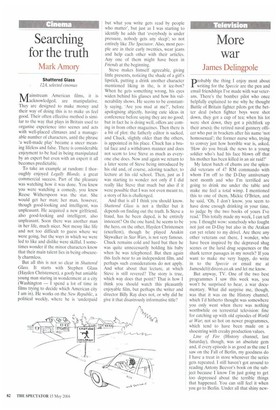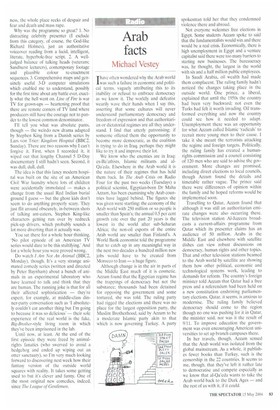More war
James Delingpole
probably the thing I enjoy most about writing for the Speccie are the pen and email friendships I've made with war veterans. There's the bomber pilot who once helpfully explained to me why he thought Battle of Britain fighter pilots got the better deal (when fighter boys were shot down, they got a cup of tea; when his lot were shot down, they got a pitchfork up their arses); the retired naval gunnery officer who put in brackets after his name 'not homosexual'; the former nurse who, trying to convey just how horrible war is, asked, 'How do you break the news to a young soldier who's had his face blown off that his mother has been killed in an air raid?'
My latest batch of chums are the splendid veterans of 47 RM commando with whom I'm off to the D-Day anniversary next month and who I'm terrified are going to drink me under the table and make me feel a total wimp. I mentioned this to one of them, Mickie O'Brien, and he said, 'Oh, I don't know, you seem to have done enough drinking in your time, to judge by the two books of yours I've read.' This totally made my week, I can tell you. I thought wow: somebody who fought not just on D-Day but also in the Arakan can yet relate to my drivel. Are there any other veterans out there, I wonder, who have been inspired by the depraved shag scenes or the lurid drug sequences or the shark terror passages in my novels? If you want to make me very happy, do write in to the Speccie or email me at Jamesdel@dircon.co.uk and let me know.
But anyway, TV. One of the two best programmes I saw this week was, you won't be surprised to hear, a war documentary. What did surprise me, though, was that it was on the History channel, which I'd hitherto thought was somewhere you only went when there was nothing worthwhile on terrestrial television: fine for catching up with old episodes of World at War, not so hot on newer programmes, which tend to have been made on a shoestring with creaky production values.
Line of Fire (History channel, last Saturday), though, was an absolute gem and, if every episode is as good as the one I saw on the Fall of Berlin, my goodness do I have a treat in store whenever the series gets repeated. I still haven't got around to reading Antony Beevor's book on the subject because I know I'm just going to get too depressed about the terrible things that happened. You can still feel it when you go to Berlin. Under all that shiny new
ness, the whole place reeks of despair and fear and death and mass rape.
Why was the programme so great? 1. No distracting celebrity presenter (I exclude from this category, of course, the God-like Richard Holmes), just an authoritative voiceover reading from a lucid, intelligent, literate, hyperbole-free script. 2. A welljudged balance of talking heads (veterans; Sandhurst lecturers), contemporary footage and plausible colour re-enactment sequences. 3. Comprehensive maps and genuinely useful 3-D computer simulations which enabled me to understand, possibly for the first time about any battle ever, exactly what the hell went on. Line of Fire is war TV for grown-ups — heartening proof that there are remote corners of TV land where producers still have the courage not to pander to the lowest common denominator.
I'll tell you what was absolute pants, though — the weirdo new drama adapted by Stephen King from a Danish series by Lars von Trier: Kingdom Hospital (BBC2. Sunday). There are two reasons why I can't forgive it. First, when I recorded it, it wiped out that lengthy Channel 5 D-Day documentary I still hadn't seen. Second, it was dull. dull, dull.
The idea is that this fancy modern hospital was built on the site of an American Civil War laundrywhere lots of children were accidentally immolated — makes a change from the usual Red Indian burial ground I guess — but the ghost kids don't seem to do anything properly scary. They just flit around obscurely, in-between shots of talking ant-eaters, Stephen King-like characters getting run over by redneck pick-up drivers, which probably sounds a lot more diverting than it actually was.
You sat there for a whole hour thinking, 'No pilot episode of an American TV series would dare to be this stultifying.' And for a whole hour you were proved wrong.
Do watch I Am Not An Animal (BBC2, Monday). though. It's a very strange animated comedy series (written and directed by Peter Baynham) about a bunch of animals in an experimental laboratory who have learned to talk and think that they are human. The running joke is that for all their affected sophistication — they're expert, for example, at middle-class dinner-party conversation such as 'I absolutely couldn't eat another thing but I'm going to because it was so delicious' — their sole experience of the real world is the fake, Big-Brother-style living room in which they've been imprisoned in the lab.
Until now, at least, At the end of the first episode they were freed by animalrights fanatics (who swerved to avoid a hedgehog and ended up wiping out an otter sanctuary), so I'm very much looking forward to discovering next week how their fantasy version of the outside world squares with reality. It takes some getting used to but it's clever and funny. One of the most original new comedies, indeed, since The League of Gentlemen.



































































































 Previous page
Previous page